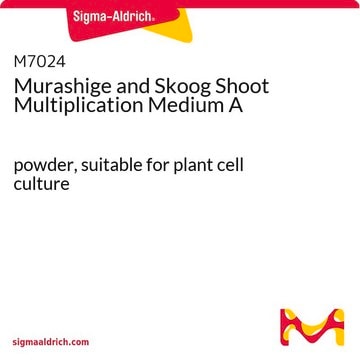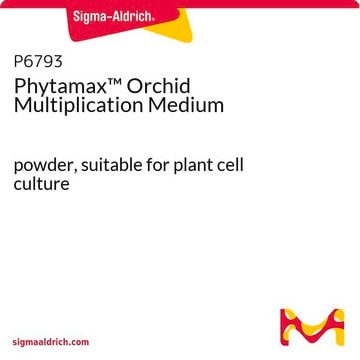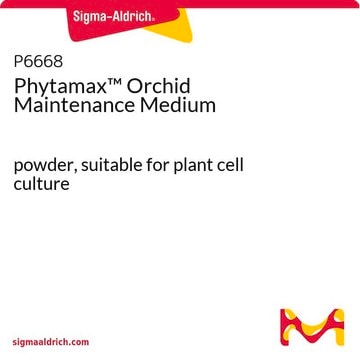M9274
Murashige and Skoog Basal Medium
suitable for plant cell culture, with sucrose and agar
Synonym(s):
MS Basal Medium
Sign Into View Organizational & Contract Pricing
All Photos(1)
About This Item
Recommended Products
Quality Level
form
powder
technique(s)
cell culture | plant: suitable
application(s)
agriculture
shipped in
ambient
storage temp.
2-8°C
Looking for similar products? Visit Product Comparison Guide
Application
Murashige and Skoog Basal Medium has been used for culturing Arabidopsis transgenic seeds for cotyledon development, pearl millet (Pennisetum glaucum), and Rosmarinus ofcinalis L. for callus induction
Formula variant
With the macro- and micronutrients, vitamins, sucrose and agar as described by Murashige and Skoog (1962).
Media Formulation
Media Formulation
Quantity
Formulated to contain 42.4 grams of powder per liter of medium.
related product
Product No.
Description
Pricing
Signal Word
Warning
Hazard Statements
Precautionary Statements
Hazard Classifications
Eye Irrit. 2 - Ox. Sol. 3
Storage Class Code
5.1B - Oxidizing hazardous materials
WGK
WGK 2
Flash Point(F)
Not applicable
Flash Point(C)
Not applicable
Certificates of Analysis (COA)
Search for Certificates of Analysis (COA) by entering the products Lot/Batch Number. Lot and Batch Numbers can be found on a product’s label following the words ‘Lot’ or ‘Batch’.
Already Own This Product?
Find documentation for the products that you have recently purchased in the Document Library.
Customers Also Viewed
Antoine Fort et al.
The New phytologist, 209(2), 590-599 (2015-09-24)
Heterosis is the phenomenon whereby hybrid offspring of genetically divergent parents display superior characteristics compared with their parents. Although hybridity and polyploidy can influence heterosis in hybrid plants, the differential contributions of hybridity vs polyploidy to heterosis effects remain unknown.
Striking effects of melatonin on secondary metabolites produced by callus culture of rosemary (Rosmarinus officinalis L.)
Coskun Y, et al.
Plant Cell, Tissue and Organ Culture, 138(1), 89-95 (2019)
Baba Ngom et al.
Plant signaling & behavior, 12(9), e1356967-e1356967 (2017-08-02)
Cytosine DNA methylation is an epigenetic regulatory system used by plants to control gene expression. Methylation pattern always changes after abiotic stresses, pathogens and pest infections or after a treatment with salicylic acid (SA). The latter is a key player
Laure Audonnet et al.
Gene expression patterns : GEP, 25-26, 1-7 (2017-04-13)
Dimethylation of histone H3 lysine 9 (H3K9me2) is a heterochromatic mark linked to DNA methylation and gene repression. Removal of H3K9me2 from gene bodies by the jmjC histone demethylase IBM1/JMJ25 inhibits DNA methylation and derepresses gene expression. In this work
Smita P Chavan et al.
Applied microbiology and biotechnology, 89(6), 1701-1707 (2010-12-02)
The present study examined the effects of plant growth hormones, incubation period, biotic (Trametes versicolor, Mucor sp., Penicillium notatum, Rhizopus stolonifer, and Fusarium oxysporum) and abiotic (NaCl, MgSO(4), FeSO(4), ZnSO(4), and FeCl(3)) elicitors on cell growth and α-tocopherol and pigment
Our team of scientists has experience in all areas of research including Life Science, Material Science, Chemical Synthesis, Chromatography, Analytical and many others.
Contact Technical Service













